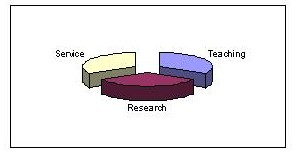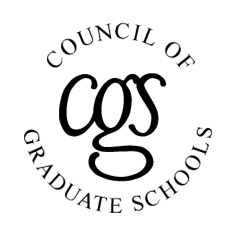
The
faculty role generally encompasses three areas of responsibility: Teaching,
Research, and Service. Contrary to the diagram above, what proportion
of time a faculty member spends (or is expected to spend) in each area
varies generally by institution type and more specifically from institution
to institution.
Teaching generally includes actual in-class time working with students,
as well as time spent mentoring and directing research by graduate students
and preparing for class. Depending on the specific institution, such
time could also include office hours as well as time spent revising
old or creating new courses. Over the last decade, much work has been
accomplished in advancing the notion of a scholarship of teaching, wherein
the endeavor of teaching becomes a dynamic interchange of knowledge
between the teacher and the learner, with pedagogical approaches being
continuously assessed for effectiveness for the student as well as in
relation to the subject matter. The work of Ernest Boyer, Parker Palmer
and others in this area has greatly elevated the perception of teaching
as an important and valued role for faculty.
Research refers to the inquiry and/or discovery activities of the faculty
member. Research includes writing text books, doing oral histories or
assessing the impact of a social service program. Faculty members in
all institution types engage in some form of intellectual inquiry that
demands a significant portion of their time and energy and should also
be valued as research.
Service in the context of academia generally refers to service to the
institution, the external community, and the larger academic community.
What qualifies as service, again, varies greatly upon the specific institution.
For example, small liberal arts colleges often require faculty to be
active in shared governance through active engagement in faculty senate
meetings, exercise of control over the curriculum, and involvement in
advising students or similar activities that support the mission of
the institution. In other institutions, service means service to the
particular department of which the faculty is a member. Such duties
might include participation on departmental or college-level committees
or advising of students who are majors of the department. This is particularly
true of larger institutions where meetings of the entire faculty are
rare. Other institutions expect service to also include leadership in
community service activities in the institution's city or state. Service
also includes activities and leadership in professional societies and
other national organizations as well as service on study sections for
granting agencies, participation in advisory councils, etc.
Back
home | Back
to top
Teaching Resources:
© Preparing Future
Faculty. All Rights Reserved.


